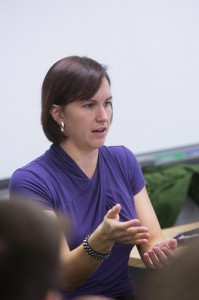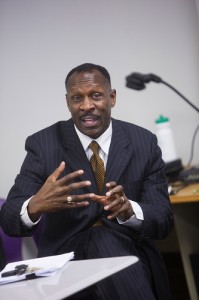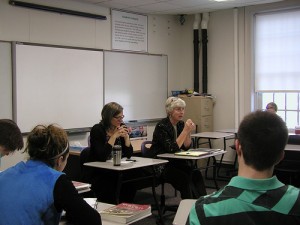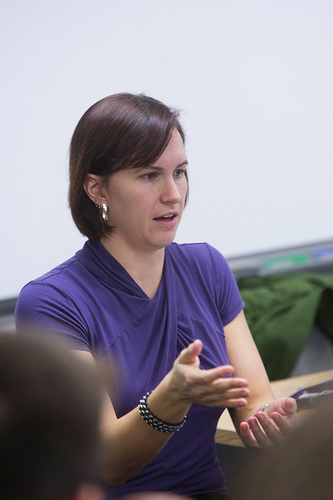“Are sports connected to what’s happening in the classroom?” It was their search for the answer to that question that lead Smith College professors Don Siegel and Sam Intrator to found an innovative, Springfield-based program called Project Coach.
 In early December, the two professors, plus two others from their program, brought that question to students at The Williston Northampton School.
In early December, the two professors, plus two others from their program, brought that question to students at The Williston Northampton School.
“There’s a notion that what’s going on in the playing fields connects to what’s going on in other parts of kids’ lives,” Siegel told the students. “The way to the boardroom leads through the locker room.”
The same question could be applied to the class—a new Williston Scholars program called Sports Studies. Created by Diane Williams, a history and global studies teacher, the course features a large slate of visiting speakers and is designed to give students local examples of “sports being used in a meaningful way to impact people’s lives.”
The trimester began with a visit from Luma Mufleh, founder of the Fugees Academy and soccer team, and has continued with talks by the Project Coach team and Billy McBride, assistant athletic director at Amherst College and former pro football player. Almost a dozen other speakers are scheduled to visit Sports Studies over the course of the rest of the year.

“There are people in the Pioneer Valley doing interesting and powerful work,” said Williams. “It is always inspiring to meet these people and see what is going on right down the road.”
In December, four members of the Project Coach team visited Williston’s Sports Studies to talk about the nonprofit, particularly how the organization trains high school students in communicating, goal-setting, and taking initiative. College freshman Loeb Rosario provided a student perspective; Don Siegel and Sam Intrator talked about the founding of the organization; and executive director Kayleigh Colombero spoke about how the goals of the project are applied to the playing field, the classroom, and students lives.
After the class, Williams said the Williston students seemed impressed by the idea of high school students having an impact in the community.
“I think that the students were struck not only by the great work that Project Coach does, but also the way they do it,” said Williams. “Project Coach works within the community for the benefit of the community.”

In January, two athletic directors—Lisa Melendy of Williams College, and Lynn Oberbillig of Smith College—spoke about some of the opportunities and challenges facing collegiate athletics, particularly at the NCAA Division III level. According to NCAA rules, Division III programs cannot offer athletic scholarships, but those same schools may be able to provide a better balance between sports and studies, they said.
Both Melendy and Oberbillig talked about the challenges of young athletes attending expensive clinics and travel teams in a bid to be recruited to Divisions I or II. The best athletes, they argued, were not those who specialized early, but those who balanced multiple sports, academics, and extracurriculars.
“We’ve got to find answers to some of this. For your sanity, too,” said Oberbillig. “Chasing after schools at the age of 15, 16, 17 years old because you want to play sports and you want to go to a good school is crazy. You’re not having fun growing up.”
After class, Daniel Gould ’13 said he appreciated the unique perspectives of each speaker, particularly when it came to the variety of their points of view.
“It’s nice to have different people come in and talk about what their experiences are,” Gould said. “It’s a good change of pace.”


